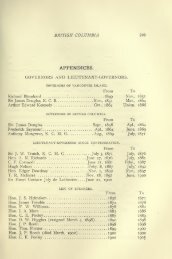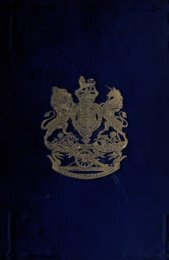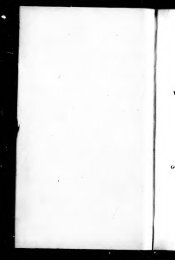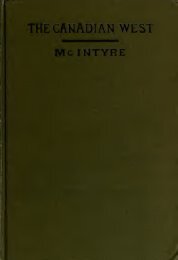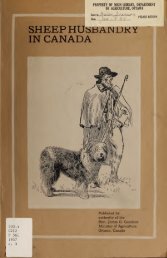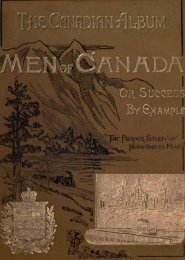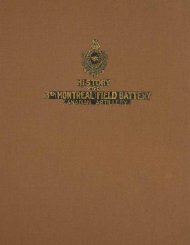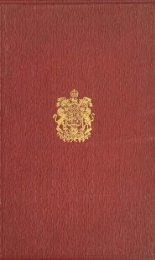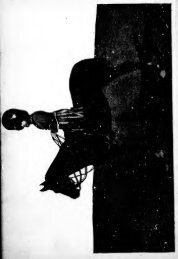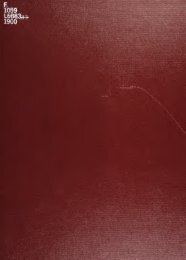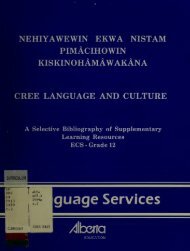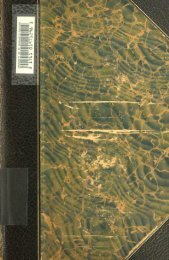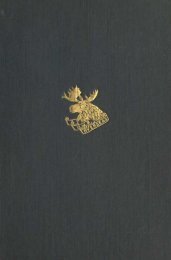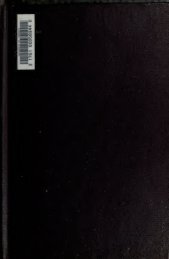The league of the Iroquois and other legends : from the Indian muse
The league of the Iroquois and other legends : from the Indian muse
The league of the Iroquois and other legends : from the Indian muse
Create successful ePaper yourself
Turn your PDF publications into a flip-book with our unique Google optimized e-Paper software.
304 NOTES.<br />
pose, so very miserable, nor, relatively, so very abject ;<br />
she is sure <strong>of</strong> protection ;<br />
sure <strong>of</strong> maintenance, at least while <strong>the</strong> inau has it ;<br />
sure <strong>of</strong> kind treatment ;<br />
sure<br />
that she will uever have her children taken <strong>from</strong> her but by death ;<br />
sees uoue<br />
better <strong>of</strong>f than herself, <strong>and</strong> it is evident that in such a state <strong>the</strong> appointed <strong>and</strong><br />
necessary share <strong>of</strong> <strong>the</strong> woman is <strong>the</strong> household work, <strong>and</strong> all o<strong>the</strong>r domestic<br />
labors." Mus. JAMISON, in Winter Studies <strong>and</strong> Summer Rambles.<br />
From unpublished notes by <strong>the</strong> late Mr. W. H. Clarke, <strong>of</strong> Chicago, whose<br />
acquaintance with leading <strong>Indian</strong>s <strong>of</strong> <strong>the</strong> West extended over many years, I am<br />
permitted to make some extracts. He was well acquainted with Mrs. Schoolcraft,<br />
to whom <strong>the</strong> world is greatly indebted for her praiseworthy efforts to preserve<br />
<strong>the</strong> legendary lore <strong>of</strong> <strong>the</strong> <strong>Indian</strong>s. Herself <strong>of</strong> <strong>Indian</strong> lineage, <strong>and</strong> spending<br />
<strong>the</strong> greater part <strong>of</strong> a long life among her people, her statements cannot but be<br />
taken as trustworthy.<br />
In answer to questions as to <strong>the</strong> condition <strong>of</strong> <strong>the</strong> <strong>Indian</strong> women, she " said, It<br />
was better than that <strong>of</strong> <strong>the</strong> white woman, taking into consideration <strong>the</strong> differences<br />
between <strong>the</strong> races. That is to say, although on account <strong>of</strong> many inevitable<br />
causes, <strong>the</strong> <strong>Indian</strong> woman is subjected to many hardships <strong>of</strong> a physical nature,<br />
yet her position, compared to that <strong>of</strong> man, is higher <strong>and</strong> freer than that <strong>of</strong> <strong>the</strong><br />
white woman."<br />
"OMriC. !" said she, "why will <strong>the</strong>y look only upon one side? <strong>the</strong>y ei<strong>the</strong>r<br />
exalt <strong>the</strong> Red Man into a demi-god, or degrade him into a beast. <strong>The</strong>y say he<br />
compels his wife to do all <strong>the</strong> drudgery, while he does nothing but hunt <strong>and</strong><br />
a<strong>muse</strong> himself ; forgetting that upon his activity <strong>and</strong> powers <strong>of</strong> endurance as a<br />
liuuter depends <strong>the</strong> support <strong>of</strong> his family."<br />
Note 23. " She is <strong>of</strong> my noble people Page 66.<br />
Ongue Honwe that is well."<br />
<strong>The</strong> term, ONGUE HONWE, a people surpassing all o<strong>the</strong>rs that <strong>the</strong> <strong>Iroquois</strong><br />
proudly applied to <strong>the</strong>mselves, being older than <strong>the</strong> discovery <strong>of</strong> <strong>the</strong> continent<br />
by Europeans, did not refer to <strong>the</strong>m ;<br />
but denoted a people surpassing all o<strong>the</strong>r<br />
red men. In that sense it was probably strictly true.<br />
Note 24. " No garden lilies undefiled, Page 72.<br />
No sweets <strong>the</strong>ir fragrance may possess,<br />
Surpass <strong>the</strong> roses <strong>of</strong> <strong>the</strong> wild<br />
<strong>The</strong> beauty <strong>of</strong> <strong>the</strong> wilderness."<br />
Had not <strong>the</strong> writer, in his casual intercourse with <strong>the</strong> <strong>Indian</strong>s, seen among<br />
<strong>the</strong>m maidens <strong>of</strong> surpassing beauty, comparing favorably with <strong>the</strong> most lovely<br />
maidens <strong>of</strong> <strong>the</strong> White Race, he would hardly have ventured to give expression to<br />
what will probably seem to many as existing only in <strong>the</strong> pictures <strong>of</strong> an exalted<br />
imagination.<br />
Fredrika Bremer, in her Homes <strong>of</strong> <strong>the</strong> New World, says <strong>of</strong> an <strong>Indian</strong> maiden<br />
she saw in Minnesota : "She was so brilliant <strong>and</strong> <strong>of</strong> such unusual beauty that<br />
she literally seemed to light up <strong>the</strong> whole room as she entered. Her shoulders<br />
were broad <strong>and</strong> round, <strong>and</strong> her carriage drooping, as is usual with <strong>Indian</strong> women,



